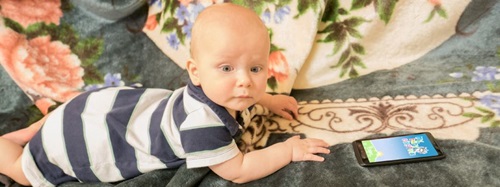Are Today's Children Screened-In?
| June 2012There was once a time when children were eager to take the world into their own hands—to smell it, taste it, and touch it. They played with it, climbed all over it, built it, and made it their own. They used every material at hand to create houses, ships, rockets, dams—whatever they needed to play out their understanding of life. They'd go to great efforts until they got their play exactly the way they wanted it. They used their hands and their limbs, their imagination and creativity. They developed language and understanding, persistence and self-control, empathy, social awareness, and much more.
Childhood has changed greatly in the past decade or two. Now the whole world is literally at children's finger tips with very little effort on their part. Through television, movies, cell phones, and computers they can access any topic and reach almost any person by simply pushing some buttons or pressing an icon. But they have far less contact with the real world than they used to. Many children are hemmed in by screens which stand between them and the three dimensional, sensory world. While media and technology have opened doors for children, their frequent presence has caused other doors to close.
It's hard to resist the allure of screens which keep us focused on them for many hours each day. How many? On average, preschool children spend 32 hours per week in front of screens. Eight- to 18-year-olds spend over 50 hours per week with media and technology. These numbers will almost certainly increase, for infants and toddlers are now strongly encouraged to focus on screens. While the White House campaign called Let's Move, Child Care recommends no screen time for children under two, 40 percent of 3-month-old infants are regular viewers of screen media, and 19% of babies one year and under have a TV in their bedroom.
It would be nice to believe that children could have it all—long hours in front of screens and a rich hands-on experience of life, but research paints a different picture:
- The more time preschool children and babies spend with screens, the less time they spend interacting with their parents. Even when parents co-view, they spend less time talking to their children than when they're engaged in other activities.
- The more time preschool children spend with screens, the less time they spend engaged in creative play—the foundation for learning, constructive problem solving, and creativity. Screen time for children under 3 is linked to irregular sleep patterns and delayed language acquisition.*
An added problem is that screen time is often habit-forming. Children who have more than sporadic exposure to screens easily become habituated to them. They rely on them every day and are upset when the connection is cut off. Their play is full of screen content, and they have a hard time formulating their own ideas and story lines. Research has found that the more time young children engage with screens, the more difficult it is to turn them off when they are older. A 2007 survey found nearly one in four children ages eight to 18 felt themselves to be addicted to video games. Addiction is never a healthy thing, whether we are talking about screens, alcohol, or drugs.
What can families and educators do?
First of all, remember, there is no evidence that children need digital technology in elementary school or below to be proficient in its use later in life. It's fine to wait, and many families and early education centers opt to do exactly that. When children are introduced to computers in middle school or later they generally catch up very quickly and often excel, especially if their creative minds have been given full scope to develop in the early years.
Record the amount of screen time currently in your children's lives and work to reduce it if it seems too high. Replace screen time with more time for play and other activities that engage all parts of the child—the physical, social, emotional, and cognitive. In particular, promote creative play and bonding with nature and with other children and caring adults. All of these vital aspects of life have declined in recent years. If screen time for young children will be part of your classroom or home, decide on appropriate amounts of screen time and stick to them. Screens have a way of taking over. Don't let them. If opting to give young children some screen time, select wisely. Don't believe the marketing claims but observe for yourself the impact of the experience on the child's growth and well-being. Intensive use of media and digital technology is a relatively new aspect of childhood and needs much more observation and assessment than it has been given, along with increased research by experts.
*This quote and all statistics are taken from the Campaign for a Commercial-Free Childhood's fact sheet,"Kids and Screens." See http://www.commercialfreechildhood.org/factsheets/screentime.pdf.
Comments
I love this article. I am going to print it and distribute it to my parents. I am director of a co-op nursery school and parents need to hear more about the need for their children to communicate and play instead of being addicted to the video games. Thank you.
Betsy Geiger
I teach a small class of 5 and 6 year olds. For years I have been cautioning parents about this very thing, but mostly to no avail. Luckily I teach in a school where I make the decisions about my class and do not use media (except for CD player for classical music) in the classroom. We also have the freedom to play and to learn from our play. Unfortunately, the world is set on justifying having children in school earlier and earlier. We have used the excuse that they learn best when they learn early. So much research has indicated that forced early academics benefits no one, and that children burn out and become discouraged when subjected to this kind of pressure. We seem to have become a nation of lemmings and just follow whatever shallow group-think comes along. The longer I teach, the more I realize that what seems to be the direct and logical path to learning is often wrong, and what really works is time, patience, and a rich play and art filled life. (And more relaxed, calm, non-invasive parental involvement.) Thank you for this article.
Maria Thornbrough
Great articles! I think I might refer "Are Today's Children Screened In?" to my sociology class as we review the use of cell phones in this day and age and how it affects us. I too often watch children "screened in" in restaurants and other places while they wait for their meal etc. What happened to coloring on the placemats! Thank you for the Collage materials!
Janet Sosnicki






